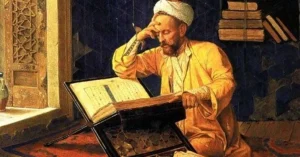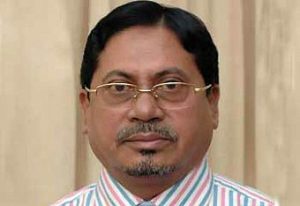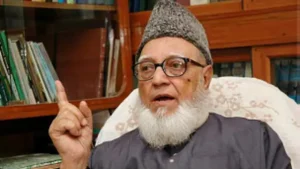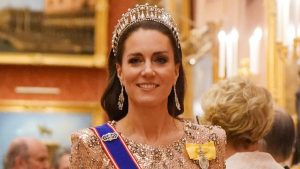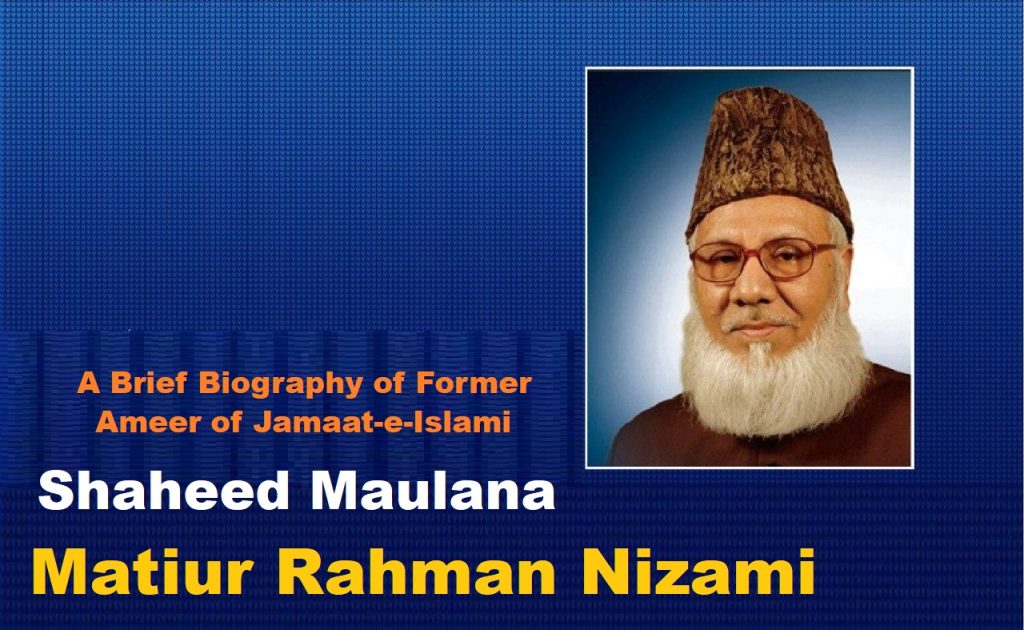
Shaheed Maulana Matiur Rahman Nizami
Early Leadership in Student Life
Since 1961, he responded to the call of the Islami Chhatra Sangha (Islamic Students’ Association) and played an active role in student movements. In 1962–63, as a talented final-year Kamil student, he led madrasa students’ movements demanding the establishment of an Islamic university. From 1962 to 1966, he served as Central Office Secretary of the Islami Chhatra Sangha. In 1966, he became President of the then East Pakistan Islami Chhatra Sangha, serving three consecutive years. Later, he was elected Central President of the All‑Pakistan Islami Chhatra Sangha, holding the position until September 1971.
Family Life
On September 16, 1974, he married Shamsunnahar. She earned an MSc in Botany from Rajshahi University and was also active in the Islamic movement since her student days. She currently serves as Secretary of the Women’s Wing of Bangladesh Jamaat‑e‑Islami. The couple had four sons and two daughters.
Opposition to the Ayub Regime
In 1964, when Ayub Khan introduced an un-Islamic and anti-democratic governance system, Jamaat‑e‑Islami spearheaded widespread protests. The government banned Jamaat on January 6, 1964, to suppress the Islamic movement, but its activists persisted through COP, DAC, and PDM campaigns demanding democratic restoration. Under his leadership, the Islami Chhatra Sangha launched an eight-point mass movement. In 1969, during efforts to build public support for the Nur Khan Education Commission report, his close associate, student leader Abdul Malek, was martyred in clashes with leftist and secular opponents.
Universally Respected Student Leader
Despite ideological differences, Maulana Nizami consistently earned widespread respect across the student community. For instance, during the anti‑Ayub movement, when student leader Asad was killed, fellow students requested him to lead the funeral prayer—and he graciously accepted. Moreover, in the political unrest following the 1970 elections, he actively supported the mass movement that demanded the unconditional transfer of power to Sheikh Mujibur Rahman. Through these actions, he demonstrated a strong commitment to justice and democratic principles, even when working across ideological lines.
Joining and Leading Jamaat‑e‑Islami
After completing his education, Maulana Nizami officially joined Jamaat‑e‑Islami on September 30, 1971. From 1979 to 1982, he served as Ameer of Jamaat’s Dhaka Metropolitan unit and participated as a member of the Central Working Council. In 1983, he became Assistant Secretary General, holding the role until 1988. He then served as Secretary General from 1988 to 2000. On November 19, 2000, the party elected him as its second Ameer, a position he retained until his martyrdom.
Assassination Attempts Due to Islamic Leadership
Maulana Nizami’s unwavering commitment to independence, democracy, sovereignty, and Islam provoked repeated attacks from secular and materialist forces. In 1991, during a peace meeting at the University of Dhaka invited by the Vice-Chancellor, attackers beat him brutally with iron rods, inflicting serious injuries that required prolonged medical treatment. In 1996, police publicly baton-charged him near the National Press Club during the Awami League regime. Despite such violence and threats, he never abandoned his principles.
Esteemed Islamic Scholar and Guide
Maulana Nizami gained deep respect from prominent Islamic scholars both at home and abroad. In 2015, the Royal Islamic Strategic Studies Centre (USA) recognized him as one of the 500 Most Influential Muslims in the World.

